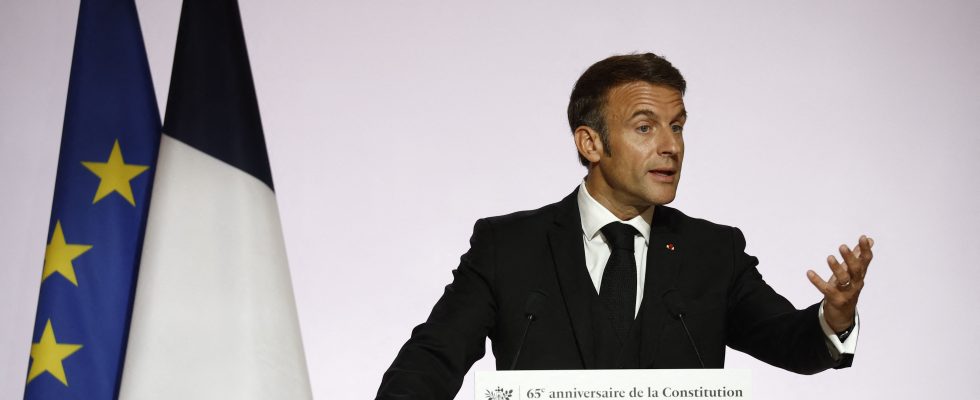For a long time, while thinking about democratic fatigue, Emmanuel Macron spoke of the idea of organizing a referendum, and even more so since the start of his second five-year term. On July 14, 2022, on television, he warned that in the event of institutional blockages, he would go “before the French” for their “submission[e] projects”. Two months later, when launching his famous CNR, he did not exclude that proposals resulting from the debates could “lead to referendums”. After the crisis caused by the pension reform, he resumed his little refrain. On April 19, he said: “The referendum is a tool and I will have to use it for subjects that I choose.” In case this was not noted, he insisted, four days later In The Parisian : “I am not going to launch a referendum today, but it would be completely healthy in the coming years to do so.” In Opinionon May 14, he repeated: “I am ready for all referendums, if it is useful for the country.”
This Wednesday, October 4, from the Constitutional Council, the president went even further: now he wants, not to organize, but… to reform the referendum. Does this mean there will end up being one by 2027? Nothing is less certain, and in this the history of article 11 of the Constitution is edifying. We have agitated it, of course, we have modified it, of course, but it has never been useful until now. In 1984, François Mitterrand, to get out of the crisis caused by the Savary bill on free schooling, was the most daring of all, who launched a referendum on the referendum – let everyone rest assured, the maneuver would not led to nothing but allowed us to divert attention from the school crisis.
In 1995, Jacques Chirac broadened the scope of the referendum to “public services”. During his campaign, the candidate proposed a referendum on national education. It is now possible, but President Chirac will never apply his own reform. In 2008, Nicolas Sarkozy added the environment as a possible subject to question the French, and again: the text of the fundamental law moves, not the head of state, who will never resort to this weapon.
The same Sarkozy also introduced what is commonly called “the shared initiative referendum”, but in such a way that the necessary conditions for its organization have never been used, and are not about to be used. . As proof, Emmanuel Macron already wishes to modify these conditions to make the implementation of this shared initiative referendum “simpler”, “excessively constrained today”. We are approaching the absurd: we will perhaps modify a text which has never been applied, which clearly proves that today we are touching the Constitution with a wavering rather than a trembling hand…
Let’s summarize: presidents make it easier to use the referendum to better distance themselves from it afterwards. Is Emmanuel Macron taking the same path? Making it a magic solution would certainly be a fatal mistake. Our columnist Denys de Béchillon writes this week in L’Express: “Let’s ask ourselves what would have happened if we had organized one, a few weeks after the Fukushima disaster, to decide on a short-term shutdown. deadline for nuclear electricity production. In all probability, the result would have been favorable – the Germans did not even need to consult each other to get there because they were so in agreement. But, as we have finally seen since our collective awareness of these last months, we would have bitten our fingers to the knuckle to have made such a crazy decision.”
“I remind you that the referendum is in my hands”
“The referendum is a sovereign choice of the Nation looking at its future,” Emmanuel Macron said grandiloquently this Wednesday. His remarks were more direct on August 30 in Saint-Denis, in front of the party leaders: “I remind you that the referendum is in my hands. It concerns a bill adopted by the Council of Ministers that the president decides to present to the French. You are asking me that the government validates your project and not ours. I did 28%, it may not be enough for you but you all did less.” Let’s translate: the president is the only master on board.
However, some, even the majority, would prefer a more pragmatic use of the referendum. Among them is still the president of the National Assembly. Yaël Braun-Pivet would consider it more effective, before embarking on a reform of article 11, to organize a referendum which is already possible in the current state of the texts – she is thinking of the end of life.
The referendum: there are those who talk about it without doing it, those who would like to do it without power, and also the French, who have been waiting for 18 years for a question to be asked of them. Last time they said no and no one forgot that.
